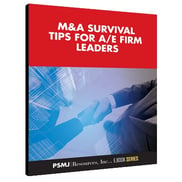

In just about any facet of one’s professional life, when you’ve got the right team assembled, you can accomplish just about anything that you set out to do. Conversely, when you’ve got a misguided or poorly-assembled team, even the most straightforward objectives can feel like moving mountains.
When it comes to a merger or acquisition, the business reality of a good team meaning the difference between success and failure rings particularly true. In this issue of the M&A Insider, we’re talking specifically about building the ‘deal team’ from a buyer’s perspective. You’ve decided that growth through acquisition is going to be a critical element of the firm’s strategic plan. You’ve defined a process for identifying and screening potential targets. Now, it is time to get the team together and make it happen.
Our experience at PSMJ has been that a well-built deal team will include the following:
-
CEO: The CEO has the overall responsibility for the firm’s strategic direction and makes the ultimate decision on capital allocation to an acquisition. Is this the best place to put our money? Is this a market that we can’t achieve our growth objective via organic means? The CEO is the one that needs to own the strategy and the decision. A great acquisition can make a CEO’s career...a bad one can break it.
-
CFO: The CFO is going to have the primary responsibility for really opening the hood of the target, building the deal thesis, and structuring the transaction. In particular, it is critical to have a CFO who is a dealmaker. Many top-notch CFOs come from a public accounting background that is built around identifying vulnerabilities and flaws. The best CFO on the deal team doesn’t lose this critical eye but must also have a mindset for getting to ‘yes’ and finding solutions.
-
Functional Manager. The Functional Manager will be a critical resource for identifying the movers and shakers in a particular market. Looking to grow in the healthcare market? Your Director of Healthcare will likely be able to rattle off several potential fits and also know the targets to stay from. More than this, the Functional Manager is going to need to live with the acquisition and play a key role in integration. Get these folks involved in the process early...don’t spring it on them after the deal has been negotiated.
-
HR Director. The HR Director’s role early on might be fairly limited. However, once a Letter of Intent is in place and due diligence and integration planning get underway, the HR Director will be able to assess skill sets, align compensation and benefits, and get in front of a whole bunch of potential people issues before they become issues. Don’t underestimate the importance of this.
Of course, depending on the size of your firm, you may scale up (getting a COO involved, for example, if that role exists in the organization) or scale down (combining the CEO and CFO roles) this team. But, the most important element to this is ensuring that there are resources and accountability to get the job done.
Most importantly, within the team of individuals stated above, there must be a Deal Champion! This is the individual that is accountable for keeping the process moving forward and advocating for the transaction. To put a finer point on it, when everybody is responsible, nobody is responsible. The Deal Champion will ensure that strategic objectives stay top-of-mind, that nobody goes falling in love too quickly, and that the quality opportunities aren’t missed because of competing day-to-day priorities. The Deal Champion holds feet to the fire and keeps this thing moving. An important point of note on this...the best deal champion is usually NOT the CEO or CFO as they exert too much influence within the buyer.
In addition to the internal team, you will also likely find that outside resources can prove invaluable to bolster the internal team. In particular, an experienced M&A consultant can find the right targets and quarterback the entire process. When the going gets tough, it can be very useful to have an experienced M&A consultant to turn to. Additionally, experienced legal and tax counsel will also be vital and a good M&A consultant will be able to manage these resources and bring them into the fold where and when needed.
 Merger & Acquisition (M&A) activity in the architecture and engineering space is certainly on the upswing and well on its way to reaching pre-recession levels. But, how ready are you for taking on the task of buying or selling an A/E firm? If you are looking for tips to help your firm navigate through the M&A process, check out PSMJ complimentary ebook M&A Survival Tips for A/E Firm Leaders.
Merger & Acquisition (M&A) activity in the architecture and engineering space is certainly on the upswing and well on its way to reaching pre-recession levels. But, how ready are you for taking on the task of buying or selling an A/E firm? If you are looking for tips to help your firm navigate through the M&A process, check out PSMJ complimentary ebook M&A Survival Tips for A/E Firm Leaders. 
Other M&A Related Posts
Getting Ready to Sell? Think Like a Buyer!
What You Must Know About Private Equity
Growing Revenue = Growing Valuation? Be Careful What You Wish For!
Expert Interview: Assessing Current M&A Market Conditons and Trend


